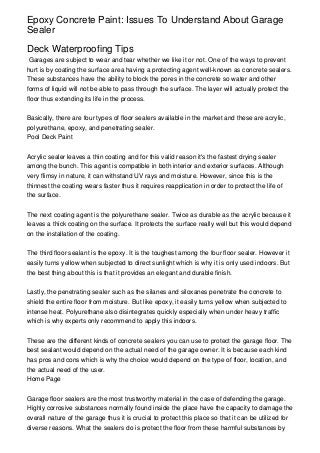
Epoxy Concrete Paint: Issues To Understand About Garage Sealer
- 1. Epoxy Concrete Paint: Issues To Understand About Garage Sealer Deck Waterproofing Tips Garages are subject to wear and tear whether we like it or not. One of the ways to prevent hurt is by coating the surface area having a protecting agent well-known as concrete sealers. These substances have the ability to block the pores in the concrete so water and other forms of liquid will not be able to pass through the surface. The layer will actually protect the floor thus extending its life in the process. Basically, there are four types of floor sealers available in the market and these are acrylic, polyurethane, epoxy, and penetrating sealer. Pool Deck Paint Acrylic sealer leaves a thin coating and for this valid reason it's the fastest drying sealer among the bunch. This agent is compatible in both interior and exterior surfaces. Although very flimsy in nature, it can withstand UV rays and moisture. However, since this is the thinnest the coating wears faster thus it requires reapplication in order to protect the life of the surface. The next coating agent is the polyurethane sealer. Twice as durable as the acrylic because it leaves a thick coating on the surface. It protects the surface really well but this would depend on the installation of the coating. The third floor sealant is the epoxy. It is the toughest among the four floor sealer. However it easily turns yellow when subjected to direct sunlight which is why it is only used indoors. But the best thing about this is that it provides an elegant and durable finish. Lastly, the penetrating sealer such as the silanes and siloxanes penetrate the concrete to shield the entire floor from moisture. But like epoxy, it easily turns yellow when subjected to intense heat. Polyurethane also disintegrates quickly especially when under heavy traffic which is why experts only recommend to apply this indoors. These are the different kinds of concrete sealers you can use to protect the garage floor. The best sealant would depend on the actual need of the garage owner. It is because each kind has pros and cons which is why the choice would depend on the type of floor, location, and the actual need of the user. Home Page Garage floor sealers are the most trustworthy material in the case of defending the garage. Highly corrosive substances normally found inside the place have the capacity to damage the overall nature of the garage thus it is crucial to protect this place so that it can be utilized for diverse reasons. What the sealers do is protect the floor from these harmful substances by
- 2. providing a protective coat on the surface and even inside the pores. Without these agents, these highly damaging substances can seep through the pores and destroys the floor from within leaving one with a poor or a squalid garage. Garage owners need to know that there are four types of concrete sealers that can help extend the life of the garage. Although all four have the ability to protect the floor, they aren?t that perfect because each has its pros and cons. For example, acrylic sealers are reliable but to a short extent because it leaves a thin layer which can wear easily especially under heavy traffic. Polyurethane sealer on the other hand outperforms acrylic however its ability to protect the floor would depend on the application. Failure to prep the floor and follow the preparation of the mixture can actually lead to poor result which is why it is important to consider the complexity of this particular floor sealer. Other types of sealer such as the epoxy and penetrating sealer do well against corrosive chemicals and abrasion. But these two are weak when subjected to direct sunlight. For instance, epoxy stains easily while penetrating sealer thins definitely when exposed to heat which is why some users only apply them indoors. Epoxy Garage Floors Apart from these dilemmas, floor sealers also share one common disadvatange and that they all leave a slippery surface. Floor sealers are known to leave shiny and elegant floors. However, this aspect leaves the floor very slippery which is why people are reminded to take necessary precaution when walking above a treated floor in order to avoid slips and falls. Although manufacturers have already addressed this problem but buyers are still reminded to be cautious when applying these substances on garage floors. All in all, floor sealers perform well when it comes to extending the life of the garage. However, buyers have to understand how each type works in order to fully utilize the product.